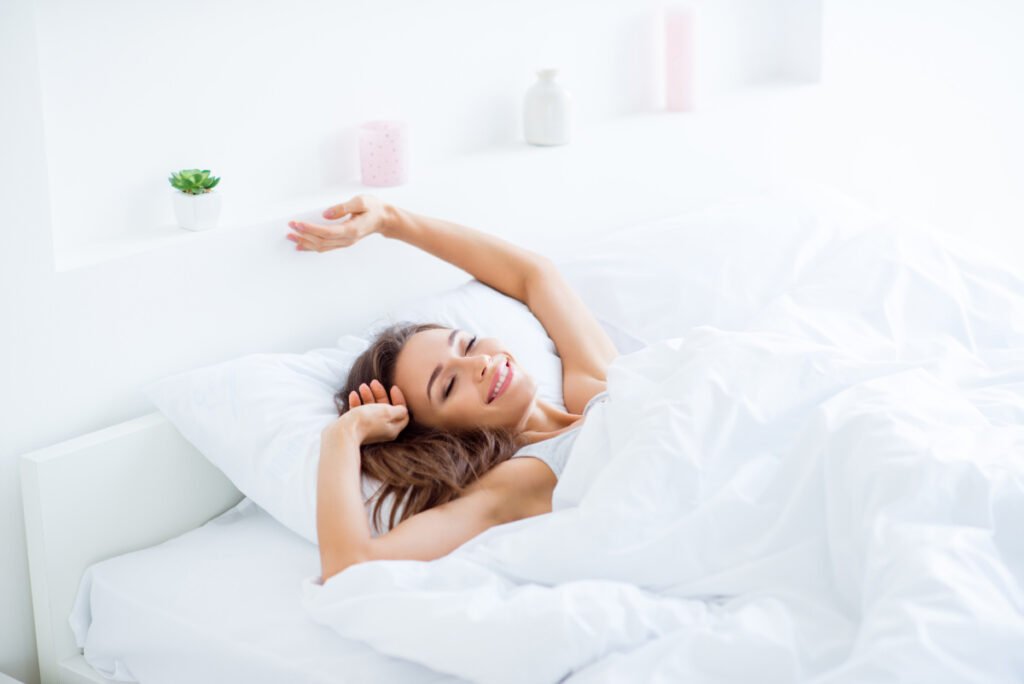Skin & Beauty Sleep: Here’s How Sleep Helps Your Skin Repair Itself

We’ve all heard the expression “beauty sleep.” People have thought for a long time that there is an important connection between how we sleep and how we look, which makes intuitive sense. More recently, however, scientists have begun to find compelling evidence for the connection—and also increasing our understanding of why it exists.
Keep reading to find out about the effects of poor sleep habits on your skin and why this everyday activity has such a big impact on your appearance.
Are You Getting Enough Sleep?
Proper sleep is one of our basic needs. Unfortunately, we live in a time when it can be especially difficult to get enough of it. Experts recommend the average adult should get between seven and nine hours of sleep a night. And yet as many as 41% of Americans get less than seven hours.
Those concerned with public health warn us that this is a serious problem. Lack of sleep is associated with a large number of health problems, including diabetes, heart disease, obesity, and depression. More obviously, it impairs both our mood and performance during the day.
So we have lots of reasons to prioritize getting adequate sleep. But what are the effects of poor sleep on our physical appearance in particular?
Sleep and Your Appearance
An interesting study published in the journal Sleep explored the effects of sleep deprivation on the appearance of the face. Those who lacked sleep had redder eyes, hanging eyelids, darker circles under their eyes, paler skin, more drooping at the corners of their mouths, and appeared sadder.
More surprisingly, they also appeared to have more fine lines and wrinkles. This result was supported by another study that found those with too little sleep scored worse on a test of skin aging. The same study found the skin of those with adequate sleep was able to recover better from environmental stressors like UV radiation. Those with more sleep were also happier with their own appearance.
Those who lacked sleep had redder eyes, hanging eyelids, darker circles under their eyes, paler skin, more drooping at the corners of their mouths, and appeared sadder.
What is it about sleep that has such a significant impact on our skin? Although we don’t yet understand everything that is going on, scientists think they have at least part of the answer.
Sleep’s Role in Healthy Skin
Sleep is a time for your body to rest and repair. This is true for your skin just as much as for any other part of your body. If you don’t get enough sleep, your body will lack the necessary time for the maintenance that keeps your skin looking healthy.
One of the aspects of this maintenance is producing the collagen that is a major component of our skin. Collagen helps our skin maintain elasticity and hydration, and as we age, we naturally produce less of it. Getting too little sleep suppresses production even further, accelerating the formation of wrinkles.
The nighttime hours are also a time when our body produces melatonin, which plays an important role in protecting the skin from sun damage. Human growth hormone (HGH) is also released mostly during sleep. It, too, appears to make an important contribution to the skin’s ability to repair itself.
In addition to interfering with these processes, insufficient sleep also contributes to stress. Chronic stress negatively affects the skin in a number of ways. For one thing, it leads to greater oil production and acne. More significantly, it inhibits healing and contributes to the damage and aging of skin.
Getting Your Beauty Sleep
You can see that getting adequate sleep is quite important. If you are habitually sleeping too little, you are contributing to the early aging of your skin and looking (and feeling) worse than you might otherwise. Even more importantly, you’re negatively affecting the overall health of your body.
What can you do to improve your quality of sleep? Here are some proven options to try:
- Be intentional: Go to bed at a time that allows you enough hours of rest. There will always be the temptation to let the demands of life steal from your hours of sleep, but proper rest is an important investment in both your long-term health and day-to-day appearance.
- Be consistent: Having a regular schedule of going to bed and getting up helps you cooperate with your body’s natural circadian rhythm.
- Avoid electronics: Screen time near to bed suppresses the secretion of melatonin and interferes with your sleep.
- Exercise: Exercise during the day helps you fall asleep more quickly and experience higher quality sleep.
If you haven’t been getting enough sleep, why not give yourself the challenge of getting seven or more hours a night for the next two weeks? The science says you’ll find yourself feeling better and looking better, too. Once you do, it’s a habit that’s likely to stick.
Refresh Your Skin at Berks Plastic Surgery
The foundation for healthy skin is taking care of it—and sleep is a big part of that. But even with the best sleep, under eye bags and wrinkles can still make a permanent mark on your appearance, and you may want help erasing these signals of tiredness. At Berks Plastic Surgery in Reading, PA, we offer a number of services designed to work with your healthy routines to give you rejuvenated, beautiful-looking skin. To find out more, schedule a consultation online or by calling (610) 320-0200.
